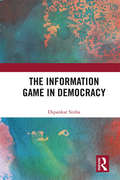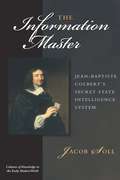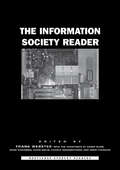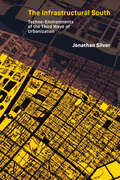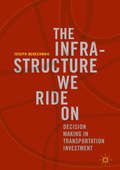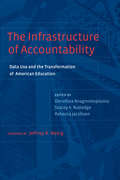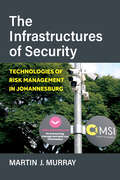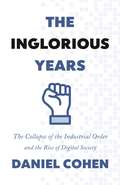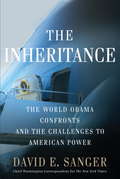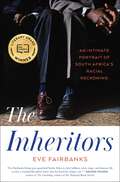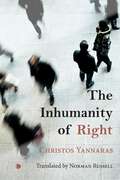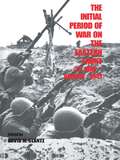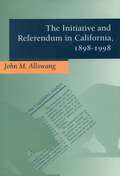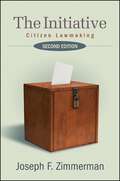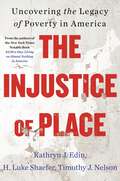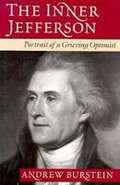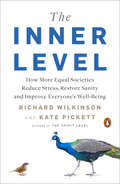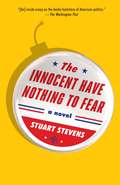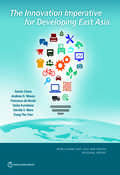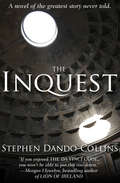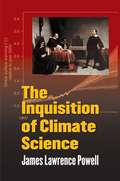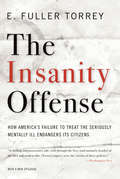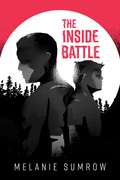- Table View
- List View
The Information Game in Democracy
by Dipankar SinhaThis book examines democracy and governance from the unconventional and largely under researched vantage point of information. It looks at the exclusionary informational dynamics in democracy and analyses the role of information capitalism, new technology, virtual networks, cyberspace and media. While emphasizing the foundational value of information as the ‘source code’ of modern societies the book explains how it is strategically maneuvered in technologies of governance in so-called established and credible democracies. It studies the neutralization and subversion as well as the complex, nuanced and multidimensional act of othering of people, who are supposed to be the repository of power in democracy and in whose interest the business of governance is expected to be conducted. The work highlights the challenges of technocratic interpretations, stunted public policy communication, hyped information society, cooption through the state-of-the-art capitalism, rhetoric of virtual networks and the often-unilateral agenda of mainstream media. A major intervention in understanding the nature of contemporary democracy and polity, this volume will be of great interest to scholars and researchers of politics, media, political communication and technology studies.
The Information Master: Jean-Baptiste Colbert's Secret State Intelligence System
by Jacob SollJean-Baptiste Colbert saw governance of the state not as the inherent ability of the king, but as a form of mechanical mastery of subjects such as medieval legal history, physics, navigation, and the price lists of nails, sails, and gunpowder. In The Information Master, Jacob Soll shows how the legacy of Colbert's encyclopedic tradition lies at the very center of the rise of the modern state. This innovative book argues that Colbert's practice of collecting knowledge originated in Renaissance Italy, where merchants recognized the power to be gained from merging scholarship and trade. By connecting historical literatures--archives, libraries, merchant techniques, and humanist pedagogy--that have usually remained separate, Soll has created an imaginative and refreshing work.
The Information Society Reader (Routledge Student Readers)
by Frank WebsterThere has been much debate over the idea of 'the information society'. Some thinkers have argued that information is becoming the key ordering principle in society, whereas others suggest that the rise of information has been overstated. Whatever the case, it cannot be denied that 'informization' has produced vast changes in advanced societies. The Information Society Reader pulls together the main contributions to this debate from some of the key figures in the field. Major topics addressed include:* post-industrialism* surveillance* transformations* the network society* democracy* digital divisions* virtual relations.With a comprehensive introduction from Frank Webster, selections from Manuel Castells, Anthony Giddens, Michel Foucault and Christopher Lasch amongst others, and section introductions contextualising the readings, this book will be an invaluable resource for students and academics studying contemporary society and all things cyber.
The Infrastructural South: Techno-Environments of the Third Wave of Urbanization (Infrastructures)
by Jonathan SilverAn in-depth look at the infrastructural landscape of Africa amid the third wave of urbanization, drawing on case studies from Africa and extending further afield.The Infrastructural South represents a major theoretical contribution to the study of infrastructure&’s role in the third wave of urbanization centered on Africa. Based on over a decade of empirical research, Silver&’s sweeping examination probes many of contemporary urbanism&’s most exciting and pressing issues through the lens of the Global South. Focusing on Uganda, Ghana, and South Africa, Silver&’s conceptually innovative chapters explore the way access to energy, water, sanitation, transit, and information technologies shape everyday life as they map the dynamic relations between cities, technology, and the environment.Pushing readers to look at the wider worlds that suffuse urban systems, this theoretical and geographical perspective treats Africa&’s rapidly transforming towns and cities as complex sites of disruption, emancipation, and contradiction. In doing so, it shows how the proliferating urbanisms and contested techno-environments arise from shifting priorities in infrastructure planning, politics, and financing gaps.As urban issues become a key twenty-first-century challenge for Africa, Silver offers a comprehensive reworking of our understanding of urbanization. The Infrastructural South rethinks how global scholarship approaches infrastructure, laying pathways for future research at the intersection of technology, environmental urbanism, and urban politics.
The Infrastructure We Ride On: Decision Making In Transportation Investment
by Joseph BerechmanThis book explores the various economic and institutional factors that explain why huge investments are made in unworthy transportation mega-projects in the US and other countries. It is based on research, the general literature, economic analyses, and results from a specifically collected database showing that a significant proportion of implemented mega-projects have been found to be inferior ex-ante or incapable of delivering the returns they promised ex-post. Transportation infrastructure and other public investments of a similar scope (“mega-projects”) reflect public sector priorities and objectives, non-pecuniary as well as financial constraints, and a range of decision-making processes. This book describes how decisions made in the public sector with respect to transportation infrastructure investments are affected by the large populations and territories they serve, the estimation of the substantial opportunity costs they entail, the formal procedures instituted for quantitatively appraising projected outcomes and monetary returns, and the political environment in which these decisions are made.
The Infrastructure of Accountability: Data Use and the Transformation of American Education
by Jeffrey R. Henig Rebecca Jacobsen Dorothea Anagnostopoulos Stacey A. RutledgeThe Infrastructure of Accountability brings together leading and emerging scholars who set forth an ambitious conceptual framework for understanding the full impact of large-scale, performance-based accountability systems on education. Over the past 20 years, schools and school systems have been utterly reshaped by the demands of test-based accountability. Interest in large-scale performance data has reached an unprecedented high point. Yet most education researchers focus primarily on questions of data quality and the effectiveness of data use. In this bold and thought-provoking volume, the contributors look beneath the surface of all this activity to uncover the hidden infrastructure that supports the production, flow, and use of data in education, and explore the impact of these large-scale information systems on American schooling. These systems, the editors note, "sit at the juncture of technical networks, work practices, knowledge production, and moral order.
The Infrastructure of Accountability: Data Use and the Transformation of American Education
by Dorothea Anagnostopoulos, Stacey A. Rutledge, and Rebecca JacobsenThe Infrastructure of Accountability brings together leading and emerging scholars who set forth an ambitious conceptual framework for understanding the full impact of large-scale, performance-based accountability systems on education. Over the past 20 years, schools and school systems have been utterly reshaped by the demands of test-based accountability. Interest in large-scale performance data has reached an unprecedented high point. Yet most education researchers focus primarily on questions of data quality and the effectiveness of data use. In this bold and thought-provoking volume, the contributors look beneath the surface of all this activity to uncover the hidden infrastructure that supports the production, flow, and use of data in education, and explore the impact of these large-scale information systems on American schooling. These systems, the editors note, &“sit at the juncture of technical networks, work practices, knowledge production, and moral order.
The Infrastructures of Security: Technologies of Risk Management in Johannesburg (African Perspectives)
by Martin MurrayMuch of the South African government’s response to crime—especially in Johannesburg—has been to rely increasingly on technology. This includes the widespread use of video cameras, Artificial Intelligence, machine-learning, and automated systems, effectively replacing human watchers with machine watchers. The aggregate effect of such steps is to determine who is, and isn’t, allowed to be in public spaces—essentially another way to continue segregation. In The Infrastructures of Security, author Martin J. Murray concentrates on not only the turn toward technological solutions to managing the risk of crime through digital (and software-based) surveillance and automated information systems, but also the introduction of somewhat bizarre and fly-by-night experimental “answers” to perceived risk and danger. Digitalized surveillance is significant for two reasons: first, it enables monitoring to take place across wide "geographical distances with little time delay"; and second, it allows for the active sorting, identification, and "tracking of bodies, behaviors, and characteristics of subject populations on a continuous, real-time basis." These new software-based surveillance technologies represent monitoring, tracking, and information gathering without walls, towers, or guards.
The Inglorious Years: The Collapse of the Industrial Order and the Rise of Digital Society
by Daniel CohenHow populism is fueled by the demise of the industrial order and the emergence of a new digital society ruled by algorithmsIn the revolutionary excitement of the 1960s, young people around the world called for a radical shift away from the old industrial order, imagining a future of technological liberation and unfettered prosperity. Industrial society did collapse, and a digital economy has risen to take its place, yet many are left feeling marginalized and deprived of the possibility of a better life. The Inglorious Years explores the many ways we have been let down by the rising tide of technology, showing how our new interconnectivity is not fulfilling its promise.In this revelatory book, economist Daniel Cohen describes how today's postindustrial society is transforming us all into sequences of data that can be manipulated by algorithms from anywhere on the planet. As yesterday's assembly line was replaced by working online, the leftist protests of the 1960s have given way to angry protests by the populist right. Cohen demonstrates how the digital economy creates the same mix of promises and disappointments as the old industrial order, and how it revives questions about society that are as relevant to us today as they were to the ancients.Brilliant and provocative, The Inglorious Years discusses what the new digital society holds in store for us, and reveals how can we once again regain control of our lives.
The Inheritance: The World Obama Confronts and the Challenges to American Power
by David E. SangerReaders of The New York Times know David Sanger as one of the most trusted correspondents in Washington, one to whom presidents, secretaries of state, and foreign leaders talk with unusual candor. Now, with a historian’s sweep and an insider’s eye for telling detail, Sanger delivers an urgent intelligence briefing on the world America faces. In a riveting narrative, The Inheritance describes the huge costs of distraction and lost opportunities at home and abroad as Iraq soaked up manpower, money, and intelligence capabilities. The 2008 market collapse further undermined American leadership, leaving the new president with a set of challenges unparalleled since Franklin D. Roosevelt entered the Oval Office.Sanger takes readers into the White House Situation Room to reveal how Washington penetrated Tehran’s nuclear secrets, leading President Bush, in his last year, to secretly step up covert actions in a desperate effort to delay an Iranian bomb. Meanwhile, his intelligence chiefs made repeated secret missions to Pakistan as they tried to stem a growing insurgency and cope with an ally who was also aiding the enemy–while receiving billions in American military aid. Now the new president faces critical choices: Is it better to learn to live with a nuclear Iran or risk overt or covert confrontation? Is it worth sending U.S. forces deep into Pakistani territory at the risk of undermining an unstable Pakistani government sitting on a nuclear arsenal? It is a race against time and against a new effort by Islamic extremists–never before disclosed–to quietly infiltrate Pakistan’s nuclear weapons program. “Bush wrote a lot of checks,” one senior intelligence official told Sanger, “that the next president is going to have to cash.”The Inheritance takes readers to Afghanistan, where Bush never delivered on his promises for a Marshall Plan to rebuild the country, paving the way for the Taliban’s return. It examines the chilling calculus of North Korea’s Kim Jong-Il, who built actual weapons of mass destruction in the same months that the Bush administration pursued phantoms in Iraq, then sold his nuclear technology in the Middle East in an operation the American intelligence apparatus missed. And it explores how China became one of the real winners of the Iraq war, using the past eight years to expand its influence in Asia, and lock up oil supplies in Africa while Washington was bogged down in the Middle East. Yet Sanger, a former foreign correspondent in Asia, sees enormous potential for the next administration to forge a partnership with Beijing on energy and the environment. At once a secret history of our foreign policy misadventures and a lucid explanation of the opportunities they create, The Inheritance is vital reading for anyone trying to understand the extraordinary challenges that lie ahead.
The Inheritors: An Intimate Portrait of South Africa's Racial Reckoning
by Eve FairbanksA dozen years in the making, The Inheritors weaves together the stories of three ordinary South Africans over five tumultuous decades in a sweeping and exquisite look at what really happens when a country resolves to end white supremacy. Dipuo grew up on the south side of a mine dump that segregated Johannesburg&’s black townships from the white-only city. Some nights, she hiked to the top. To a South African teenager in the 1980s—even an anti-apartheid activist like Dipuo—the divide that separated her from the glittering lights on the other side appeared eternal. But in 1994, the world&’s last explicit racial segregationist regime collapsed to make way for something unprecedented. With penetrating psychological insight, intimate reporting, and bewitching prose, The Inheritors tells the story of a country in the throes of a great reckoning. Through the lives of Dipuo, her daughter Malaika, and Christo—one of the last white South Africans drafted to fight for the apartheid regime—award-winning journalist Eve Fairbanks probes what happens when people once locked into certain kinds of power relations find their status shifting. Observing subtle truths about race and power that extend well beyond national borders, she explores questions that preoccupy so many of us today: How can we let go of our pasts, as individuals and as countries? How should historical debts be paid? And how can a person live an honorable life in a society that—for better or worse—they no longer recognize?
The Inhumanity of Right
by Christos YannarasIn this study of an important aspect of political theory, Christos Yannaras argues that the concept of the right of the individual (since Hegel's Philosophy of Right) summarizes the philosophical and cultural identity of the paradigm of modernity. The philosophical assumptions underlying the concept of right have not hitherto been subjected to a searching critique. This book maintains that the starting-point of the concept of right is a phenomenalistic naturalism, which presupposes an abstract concept of the human subject as a fundamentally undifferentiated natural individual. The question is explored of how the priority accorded to this concept of right is related to the contemporary crisis of the modern politico-social paradigm. Against the modern concept of right with its illusion of objectivity, Yannaras sketches out the basic lines of a political theory that prioritizes new social needs that reflect the relational character of the human person.
The Initial Period of War on the Eastern Front, 22 June - August 1941: Proceedings Fo the Fourth Art of War Symposium, Garmisch, October, 1987 (Soviet (Russian) Military Experience #Vol. 2)
by David M. GlantzBeginning with Operation Barbarossa, the German invasion of the Soviet Union in June 1941, this volume draws upon eye-witness German accounts supplemented with German archival and detailed Soviet materials. Formerly classified Soviet archival materials has been incorporated.
The Initiative and Referendum in California, 1898-1998
by John M. AllswangThis book provides a detailed analytic history of direct legislation—the initiative and referendum—in California from its origins in the late nineteenth century to the present day. California was one of the first states to implement mechanisms for direct legislation, and these mechanisms have been used with growing frequency as the entire process has become professionalized (from signature-gathering through fund-raising to legal challenge and defense). The author studies this important political device in terms of voter interest and behavior, its role in public issues, and how it has affected the state’s politics and government. The book first analyzes how and why direct legislation came to California, seeing it as a typical example of the disconnected nature of progressive era reforms. It then studies selectively, from among the 300 propositions that have been on California ballots, those propositions that have been most relevant to the major issues of their time, have generated the highest levels of voter interest and participation, and have shaped the development of state politics and government. The author pays particular attention to the explosion of direct legislation, in frequency and consequence, since the Proposition 13 “property tax revolution” of 1978. He also describes how California’s contemporary direct legislation experience—from tax rebellion to harsher criminal justice to controversial ethnic issues—has had national ramifications. The book concludes with a careful analysis of the current state of the initiative and referendum in California: voter attitudes toward the process, its role as a “fourth branch” of government, and arguments for and against changes in the procedure. Based on extensive research in campaign documents, manuscript collections, the contemporary press, and other primary sources, the book also makes extensive use of voting data, public opinion polls, and official filings of campaign expenditures. All in all, it is the most comprehensive study ever made of a political process that is used today in twenty-seven states.
The Initiative: Citizen Lawmaking, Second Edition
by Joseph F. ZimmermanThe initiative is the product of the populist movement, which in the late nineteenth century sought to increase voter control of what were viewed as unrepresentative state and local governments. Today, twenty-four states allow registered voters to place proposed state laws on the referendum ballot, and eighteen states authorize voters to place proposed state constitutional amendments on the referendum ballot by collecting a specified number of valid voter signatures. Numerous local governments have a charter provision or a state law provision allowing voters to employ the popular lawmaking device. In The Initiative, Second Edition, Joseph F. Zimmerman traces the origin and spread of the initiative in the United States. The initiative has been a controversial device since first being introduced in South Dakota in 1898, with arguments both in support and in opposition. Zimmerman examines and evaluates both the legal foundation of the initiative, and the arguments against its use. He then concludes with a chapter that develops model constitutional, statutory, and local government charter provisions to assist jurisdictions and their voters contemplating adoption of the initiative or amendment of already existing constitutional, statutory, and charter initiative provisions.
The Injustice of Place: Uncovering the Legacy of Poverty in America
by Timothy J. Nelson Kathryn J. Edin H. Luke ShaeferA sweeping and surprising new understanding of extreme poverty in America from the authors of the acclaimed $2.00 a Day: Living on Almost Nothing in America. “This book forces you to see American poverty in a whole new light.” (Matthew Desmond, author of Poverty, by America and Evicted) Three of the nation’s top scholars – known for tackling key mysteries about poverty in America – turn their attention from the country’s poorest people to its poorest places. Based on a fresh, data-driven approach, they discover that America’s most disadvantaged communities are not the big cities that get the most notice. Instead, nearly all are rural. Little if any attention has been paid to these places or to the people who make their lives there.This revelation set in motion a five-year journey across Appalachia, the Cotton and Tobacco Belts of the Deep South, and South Texas. Immersing themselves in these communities, poring over centuries of local history, attending parades and festivals, the authors trace the legacies of the deepest poverty in America—including inequalities shaping people’s health, livelihoods, and upward social mobility for families. Wrung dry by powerful forces and corrupt government officials, the “internal colonies” in these regions were exploited for their resources and then left to collapse. The unfolding revelation in The Injustice of Place is not about what sets these places apart, but about what they have in common—a history of raw, intensive resource extraction and human exploitation. This history and its reverberations demand a reckoning and a commitment to wage a new War on Poverty, with the unrelenting focus on our nation’s places of deepest need.
The Inner Jefferson: Portrait of a Grieving Optimist
by Andrew BursteinAndrew Burstein's The Inner Jefferson: Portrait of a Grieving Optimist at last demystifies the Jefferson of American legend and recovers the eighteenth-century man of sentiment Thomas Jefferson actually was. Burstein confronts widespread misunderstandings about Jefferson's romantic life and provides insight into the contradictions that still surround our third president. He shows Jefferson to have been a man of substance and character, yet possessed of a mean streak, alternately strong and frail, convivial and reclusive, ordinary and extraordinary. Burstein contends that the key to understanding Jefferson's consciousness lies in interpreting the passion expressed in intimate correspondence. Examining seven decades of letters and private accounts, Burstein shows us how Jefferson responded to what he read and how he used particular words and metaphors to express his hopes as well as anxieties and personal trials. The Jefferson revealed is not static; his mind develops over several decades. The Inner Jefferson removes our modern preconceptions and re-creates the mental and moral world of the eighteenth century. Burstein discovers how in the wake of the American Revolution this retiring Virginian could become to some a popular idol while appearing to others a cold and calculating subversive.
The Inner Level: How More Equal Societies Reduce Stress, Restore Sanity and Improve Everyone's Well-Being
by Kate Pickett Richard WilkinsonA groundbreaking investigation of how inequality infects our minds and gets under our skinWhy are people more relaxed and at ease with each other in some countries than others? Why do we worry so much about what others think of us and often feel social life is a stressful performance? Why is mental illness three times as common in the USA as in Germany? Why is the American dream more of a reality in Denmark than the USA? What makes child well-being so much worse in some countries than others? As The Inner Level demonstrates, the answer to all these is inequality. In The Spirit Level Richard Wilkinson and Kate Pickett put inequality at the center of public debate by showing conclusively that less equal societies fare worse than more equal ones across everything from education to life expectancy. The Inner Level now explains how inequality affects us individually, altering how we think, feel and behave. It sets out the overwhelming evidence that material inequities have powerful psychological effects: when the gap between rich and poor increases, so does the tendency to define and value ourselves and others in terms of superiority and inferiority. A deep well of data and analysis is drawn upon to empirically show, for example, that low social status leads to elevated levels of stress hormones, and how rates of anxiety, depression and addictions are intimately related to the inequality which makes that status paramount. Wilkinson and Pickett describe how these responses to hierarchies evolved, and why the impacts of inequality on us are so severe. In doing so, they challenge the conception that humans are inescapably competitive and self-interested. They undermine, too, the idea that inequality is the product of "natural" differences in individual ability. This book draws together many of the most urgent problems facing societies today, but it is not just an index of our ills. It demonstrates that societies based on fundamental equalities, sharing and reciprocity generate much higher levels of well-being, and lays out the path towards them.
The Innocent Have Nothing to Fear: A novel
by Stuart StevensA dark comedy set at a contested Republican convention, written by a veteran political insider--the funniest and most prescient novel about politics in years. "[Stevens] brings a full arsenal of gifts to this enterprise: humor, tactile prose and an insider's knowledge of the hardball tactics employed on the campaign trail.... By far the most interesting parts of this novel are the behind-the-scenes accounts of the tactical and strategic maneuvering of political operatives ...Stevens is a terrific raconteur -- funny, observant and highly entertaining." -Michiko Kakutani The New York Times New Orleans in July: it's hot and sticky and squalid. J. D. Callahan is in the middle of the political race of his life and displeased to be back in his hometown. His candidate, the sitting vice president, is neck and neck with an anti-immigrant, right-wing populist as the Republicans head into their first brokered convention in decades on the heels of a staggering global economic crisis. Soon after a series of dye bombs set off a mass panic and tilt the convention toward the vice president's law-and-order opponent, J. D.'s estranged brother shows up and asks for an inconvenient favor at a most inconvenient time, threatening to reveal a family secret that would ruin the legacy of their civil rights journalist father and destroy J. D.'s own reputation if he doesn't follow through. As J. D. scrambles to contain the damage on all sides, he finds himself contending with a sexy, gun-toting gossip columnist, an FBI agent convinced that J. D. is devious enough to set the bombs himself, and an old corrupt political friend of his late father with a not-so-hidden agenda. For the first time ever, J. D. is forced to reconcile the political career he's always put first with the past he's tried to leave behind as they careen toward each other on a disastrous collision course he may not be able to stop.Hilarious and remarkably sharp, Stuart Stevens's The Innocent Have Nothing to Fear is an endlessly entertaining whodunit and a brilliant satire of our political culture.From the Hardcover edition.
The Innovation Imperative for Developing East Asia (World Bank East Asia and Pacific Regional Report)
by Xavier Cirera Andrew D. Mason Trang Thu Tran Francesca de Nicola KuriakoseAfter a half century of transformative economic progress that moved hundreds of millions of people out of poverty, countries in developing East Asia are facing an array of challenges to their future development. Slowed productivity growth, increased fragility of the global trading system, and rapid changes in technology are all threatening export-oriented, labor-intensive manufacturing—the region’s engine of growth. Significant global challenges—such as climate change and the COVID-19 pandemic—are exacerbating economic vulnerability. These developments raise questions about whether the region’s past model of development can continue to deliver rapid growth and poverty reduction. Against this background, The Innovation Imperative in Developing East Asia aims to deepen understanding of the role of innovation in future development. The report examines the state of innovation in the region and analyzes the main constraints that firms and countries face to innovating. It assesses current policies and institutions, and lays out an agenda for action to spur more innovation-led growth. A key finding of the report is that countries’ current innovation policies are not aligned with their capabilities and needs. Policies need to strengthen the capacity of firms to innovate and support technological diffusion rather than just invention. Policy makers also need to eliminate policy biases against innovation in services, a sector that is growing in economic importance. Moreover, countries need to strengthen key complementary factors for innovation, including firms’ managerial quality, workers’ skills, and finance for innovation. Countries in developing East Asia would also do well to deepen their tradition of international openness, which could foster openness in other parts of the world. Doing so would help sustain the flows of ideas, trade, investment, and people that facilitate the creation and diffusion of knowledge for innovation.
The Inquest: A Novel of the Greatest Story Never Told
by Stephen Dando-CollinsIn the time of Vespasian, just after Rome has crushed the Jewish Revolt, Julius Varro, a Roman Questor (an investigating magistrate )is commissioned to investigate the story that a Jew rose from the dead after being crucified in Jerusalem. Because the fast-growing Nazarene sect founded by the martyr's followers is becoming a threat to the stability of the region, there is much riding on debunking the story. Questor Varro has to deal with the evidence that goes back forty years, with most witnesses long dead and the living ones lying to protect themselves. But he is intent on producing a report that will demolish the claims of these religious fanatics. His investigation stirs intrigue, religious passion, and violence, to say nothing of an attraction to a beautiful Jewish slave girl. Questor Varro's report methodically destroys the myth fueling the newborn Christian movement. But then an extraordinary event occurs that changes everything.
The Inquisition of Climate Science
by James Lawrence PowellScience is under the greatest and most successful attack in modern history. An industry of denial, abetted by media more interested in selling controversy than presenting facts, has duped half the American public into rejecting the facts of climate science--facts showing that human-caused emissions are warming the Earth. The industry of climate science denial is succeeding: public acceptance has declined even as the scientific evidence for global warming has increased. It is vital that the public understand how anti-science ideologues, pseudoscientists, and non-scientists have bamboozled them. We cannot afford to get global warming wrong, yet thanks to deniers and their methods, we are.Jim Powell's The Inquisition of Climate Science is the first book to take on comprehensively the climate science denial movement and the deniers themselves, exposing their lack of credentials, industry funding, and absence of any alternative theory to explain the observed evidence of warming. In this book, readers meet the most prominent deniers and participate in a dissection of their credentials, arguments, and lack of objectivity. James Lawrence Powell shows that the deniers use a wide variety of deceptive rhetorical techniques, many of them going back to the Greeks. While written for the general reader and non-scientist, this book is carefully researched and fully referenced. Readers with an open mind will learn that the evidence of global warming is real and see that an industry of denial has deceived the American public, putting them and their grandchildren at risk.
The Inquisition of Climate Science
by James PowellModern science is under the greatest and most successful attack in recent history. An industry of denial, abetted by news media and "info-tainment" broadcasters more interested in selling controversy than presenting facts, has duped half the American public into rejecting the facts of climate science—an overwhelming body of rigorously vetted scientific evidence showing that human-caused, carbon-based emissions are linked to warming the Earth. The industry of climate science denial is succeeding: public acceptance has declined even as the scientific evidence for global warming has increased. It is vital that the public understand how anti-science ideologues, pseudo-scientists, and non-scientists have bamboozled them. We cannot afford to get global warming wrong—yet we are, thanks to deniers and their methods.The Inquisition of Climate Science is the first book to comprehensively take on the climate science denial movement and the deniers themselves, exposing their lack of credentials, their extensive industry funding, and their failure to provide any alternative theory to explain the observed evidence of warming. In this book, readers meet the most prominent deniers while dissecting their credentials, arguments, and lack of objectivity. James Lawrence Powell shows that the deniers use a wide variety of deceptive rhetorical techniques, many stretching back to ancient Greece. Carefully researched, fully referenced, and compellingly written, his book clearly reveals that the evidence of global warming is real and that an industry of denial has deceived the American public, putting them and their grandchildren at risk.
The Insanity Offense: How America's Failure to Treat the Seriously Mentally Ill Endangers Its Citizens
by E. Fuller Torrey"Vital for all working in the mental health field . . . . Fascinating reading for anyone." --Choice E. Fuller Torrey, the author of the definitive guides to schizophrenia and manic depression, chronicles a disastrous swing in the balance of civil rights that has resulted in numerous violent episodes and left a vulnerable population of mentally ill people homeless and victimized. Interweaving in-depth accounts of landmark cases in California, Wisconsin, and North Carolina with a history of legislation and changes in the mental health care system, Torrey gives shape to the magnitude of our failure and outlines what needs to be done to reverse this ongoing--and accelerating--disaster. A new epilogue on the 2011 shooting in Tucson, Arizona, brings this tragic story up to date.
The Inside Battle
by Melanie SumrowThirteen-year-old Rebel Mercer yearns for his father's approval. His dad suffers from PTSD and spends time in their basement communicating with a racist, anti-government militia group called the Flag Bearers. He doesn't agree with his dad's ideology, but he isn't exactly speaking out against it either. Can Rebel find his voice when it's needed the most?Thirteen-year-old Rebel Mercer lives in west Texas with his dad, Nathan, and his aunt, Birdie. His dad is finally home after serving in the military, and Rebel longs for his approval. But something isn't right. His dad has PTSD, and lately he has been spending his time communicating with a racist, anti-government militia group called the Flag Bearers. Rebel doesn't agree with his dad's newfound ideas, but he turns a blind eye to them. So when his best friend Ajeet beats Rebel at a robotics tournament by using one of Rebel's pieces, Rebel begins to wonder if there's some truth to what his dad has been saying, and he lashes out at Ajeet. Expelled from school, Rebel is taken by his dad to the mountains of Oklahoma, where they meet up with the Flag Bearers. Soon his dad is engulfed in the group and its activities, and they're becoming more and more dangerous. When Rebel gets wind of a planned attack on an African American church, he knows that this group has gone too far and innocent people could get hurt. Can Rebel find his voice and stop the Flag Bearers from carrying out their plans before it's too late? The Inside Battle is a gripping story of family, bravery, and speaking up for what's right from author Melanie Sumrow.
